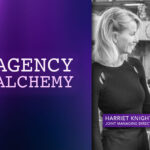By Victoria Herrick, Strategy Partner, Strat House
Working in the creative and marketing industries is thrilling. We work at the cutting edge of new technologies and alongside immensely talented and creative thinkers. We’re different and carving a unique path. Or so we like to think.
When I left the world of engineering and technology in the early 2010’s to be a marketing strategist, I thought I was entering an entirely different world. But over the past decade I’ve come to realise that the two worlds are not so very far apart.
I believe that we can learn from engineering; both as a predictor of technology progression and as a model for nurturing creativity. It’s made me want to reconnect with former colleagues and find out what they are working on now, and how they’re doing it.
That’s because, as we hurtle towards web3 and the metaverse, it strikes me that we should look from side to side, as well as forward, for our inspiration and guidance.
25 years ago, I stumbled into the world of engineering technology and became an accidental expert in industrial smart metering. Now smart metering is something we’re all familiar with, even down to having energy data on our phones.
Back then, we were talking about the internet of things and the connected home. Now I have lights that respond to a voice command and an electronic assistant who plays ‘calming music for pets’ when the dogs are fed up with my video calls. My point here is that these services, born in the world of industrial engineering, have filtered into our daily lives after a long latency period. So perhaps we should be looking more intently now at what our friends the engineers are doing.
In 2009 I saw a stereoscopic headset in action for the first time. The VR headset, hooked up to some fiendishly smart process simulation software, delivered pioneering steps in fully immersive VR training. The engineering tech company that I worked for had created a bespoke safe and virtual world where true to real-life training of process plant workers could take place. It’s pretty cool stuff. You can check out what my former colleagues (now at Aveva) are doing.
While the metaverse is having its moment in the limelight, it’s a great time to pause and think what we can learn from earlier applications like this. To me, this looks just like an early manifestation of the metaverse filling an urgent, practical need.
When it comes to finding a role for the metaverse in our lives, I’ll be placing my bets on uses that meet fundamental needs, versus inventing new ones and simple practical activations versus flamboyant creative showboating.
A year later in 2010 I was involved in the acquisition of a workflow automation business. The workflows in question related to manufacturing and processing and the rationale was compelling. This new software would automate repetitious process steps, remove error and free-up skilled workers for more value-adding creative work. Sounds familiar? It’s the same concept that is behind the workflow automation that is now a feature of most customer experience platforms.
In our world it’s still nascent. In engineering it’s embedded.
The brilliant chemical and process engineers that I worked with have a more in common with marketeers, strategists and creatives than you might at first think.
Engineering is fundamentally creative (with a bit of maths and science thrown in too). But without creative thinking there is nothing. And without process there is chaos. That’s why engineers are also trained to be process focused. This doesn’t stifle their creativity — it gives it a better chance of success.
At Strat House, we firmly believe that process and creativity should be soul mates, just as engineers do. Recently we’ve been working with Kraft Heinz and adidas to deliver frameworks and standards; so that they and their agencies are freed to be more creative.
It’s also why we’ve borrowed problem-solving methodology from Six Sigma, a toolkit more commonly associated with manufacturing. Like engineers, we think the best solutions come when we resist the urge to jump directly to the solution and instead sift meticulously through causes, assumptions, symptoms and side effects to lay out the problem. And only then do we start to think about solutions.
It’s a refreshingly efficient way of working.
As we enter a brave new phase in the evolution of marketing it is only right that we look around us for help and inspiration. Someone somewhere in your personal or business network is an engineer. Have a chat with them about what they’re working on. Compare notes on how they get stuff done. Ask them what they think the metaverse will be for.
You may learn something valuable.








